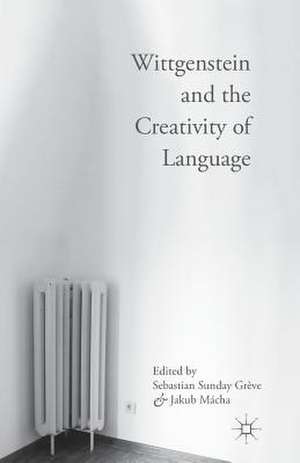Wittgenstein and the Creativity of Language
Editat de Sebastian Sunday Grève, Jakub Máchaen Limba Engleză Paperback – 5 feb 2019
This volume is the first to focus on a particular complex of questions that have troubled Wittgenstein scholarship since its very beginnings. The authors re-examine Wittgenstein’s fundamental insights into the workings of human linguistic behaviour, its creative extensions and its philosophical capabilities, as well as his creative use of language. It offers insight into a variety of topics including painting, politics, literature, poetry, literary theory, mathematics, philosophy of language, aesthetics and philosophical methodology.
Preț: 269.04 lei
Nou
Puncte Express: 404
Preț estimativ în valută:
51.49€ • 53.61$ • 43.51£
51.49€ • 53.61$ • 43.51£
Carte tipărită la comandă
Livrare economică 07-21 martie
Preluare comenzi: 021 569.72.76
Specificații
ISBN-13: 9781349580736
ISBN-10: 1349580732
Pagini: 314
Ilustrații: XXI, 314 p.
Dimensiuni: 148 x 210 mm
Greutate: 0.4 kg
Ediția:1st ed. 2016
Editura: Palgrave Macmillan UK
Colecția Palgrave Macmillan
Locul publicării:London, United Kingdom
ISBN-10: 1349580732
Pagini: 314
Ilustrații: XXI, 314 p.
Dimensiuni: 148 x 210 mm
Greutate: 0.4 kg
Ediția:1st ed. 2016
Editura: Palgrave Macmillan UK
Colecția Palgrave Macmillan
Locul publicării:London, United Kingdom
Cuprins
Recenzii
'Wittgenstein and the Creativity of Language is an exceptionally stimulating collection on a crucial new subject, the creative potential of ordinary language (artistic, scientific, philosophical). Grève and Mácha bring together a powerful group of authors whose various approaches to the topic strike a perfect balance between interpretative scholarship and philosophical originality.'
- Sandra Laugier, Professor of Philosophy, Université Paris 1 Panthéon-Sorbonne, France
'These essays explore both the standing possibility of creative language use and Wittgenstein's own creative uses of language. In doing so they advance and enrich our understandings of distinctively human and discursive being-in-the-world as both emergent within practices and capable of exceeding them. They will captivate anyone with a sense of the uncanniness of the ordinary and the vicissitudes of the human.'
- Richard Eldridge, Charles and Harriett Cox McDowell Professor of Philosophy, Swarthmore College, US
'This book successfully challenges our received image of Wittgenstein as a closed philosopher closed language-games, a closed end-of-philosophy conception, closed possibilities of meaning and knowing. Using Wittgenstein's own philosophical practice as a springboard, the authors show him to have been an open philosopher. Their exploration of the theme of creativity artistic, linguistic, mathematical and philosophical offers us new perspectives on skepticism, artistic and philosophical style, method, modernism and idealism.'
- Juliet Floyd, Professor of Philosophy, Boston University, US
'A bold, exhilarating, and rewarding collection of essays that uses Wittgenstein's reflections on language to gain new, original insights into poetry, painting, architecture, philosophy, and language itself.'
- Hans Sluga, William and Trudy Ausfahl Professor of Philosophy, UC Berkeley, US
- Sandra Laugier, Professor of Philosophy, Université Paris 1 Panthéon-Sorbonne, France
'These essays explore both the standing possibility of creative language use and Wittgenstein's own creative uses of language. In doing so they advance and enrich our understandings of distinctively human and discursive being-in-the-world as both emergent within practices and capable of exceeding them. They will captivate anyone with a sense of the uncanniness of the ordinary and the vicissitudes of the human.'
- Richard Eldridge, Charles and Harriett Cox McDowell Professor of Philosophy, Swarthmore College, US
'This book successfully challenges our received image of Wittgenstein as a closed philosopher closed language-games, a closed end-of-philosophy conception, closed possibilities of meaning and knowing. Using Wittgenstein's own philosophical practice as a springboard, the authors show him to have been an open philosopher. Their exploration of the theme of creativity artistic, linguistic, mathematical and philosophical offers us new perspectives on skepticism, artistic and philosophical style, method, modernism and idealism.'
- Juliet Floyd, Professor of Philosophy, Boston University, US
'A bold, exhilarating, and rewarding collection of essays that uses Wittgenstein's reflections on language to gain new, original insights into poetry, painting, architecture, philosophy, and language itself.'
- Hans Sluga, William and Trudy Ausfahl Professor of Philosophy, UC Berkeley, US
Notă biografică
Charles Altieri, UC Berkeley, US.
Maria Balaska, Paris 8 University, France.
Sebastian Sunday Grève, University of Oxford, UK.
Garry L. Hagberg, Bard College, US.
John Hyman, University of Oxford, UK.
Wolfgang Kienzler, University of Jena, Germany.
Jakub Mácha, Masaryk University, Brno, Czech Republic.
Danièle Moyal-Sharrock, University of Hertfordshire, UK.
Stephen Mulhall, University of Oxford, UK.
Alois Pichler, University of Bergen, Norway.
Rupert Read, University of East Anglia, UK.
Ben Ware, University of London, UK.
Textul de pe ultima copertă
This volume is the first to focus on a particular complex of questions that have troubled Wittgenstein scholarship since its very beginnings. The authors re-examine Wittgenstein’s fundamental insights into the workings of human linguistic behaviour, its creative extensions and its philosophical capabilities, as well as his creative use of language. It offers insight into a variety of topics including painting, politics, literature, poetry, literary theory, mathematics, philosophy of language, aesthetics and philosophical methodology
